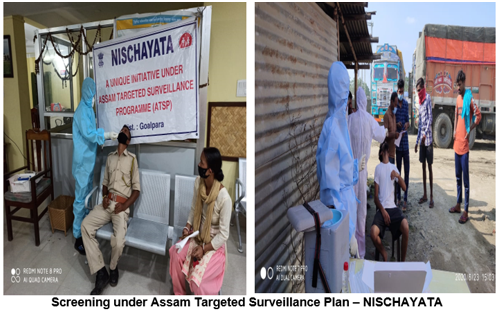
The state government of Assam has instituted robust planning and readiness measures to manage the COVID-19 pandemic with a special focus on testing, tracing and treating. NISCHAYATA, as the state’s surveillance programme has been branded means ‘assurance’ in Assamese is an initiative to assure the community that the government is concerned about peoples’ health. The state is proactively deploying measures to find more and more COVID-19 positive cases well on time to put them on early treatment. Its implementation has resulted in tracing more than 8 900 positive cases as on 16 July from Guwahati city alone. The timely identification of cases is helping in isolating each case, initiating necessary treatment, tracing of contacts and adapting other strategies for better results.
Assam has a 14-day quarantine policy for people entering the state, all of them are tested for COVID-19 before sending them for quarantine. If the result is positive, the person is admitted to a COVID-19 designated hospital and if the result is negative, they are sent for strict home quarantine. It has been seen that a majority of the cases were identified from different quarantine centres. An analysis of the available data has revealed that workers associated with public spaces like interstate truck or bus terminal, dhaba (roadside eateries), petrol pumps, hotels, garage, police and health services staff directly dealing with COVID-19 cases were possible carriers in cases for whom travel history or any direct contact of COVID-19 positive cases could not be established. Thus, it was decided to go for aggressive testing amongst people working in these vulnerable spots. Additionally, it was decided that on a random basis person, who have returned home after getting tested negative at a quarantine centre should also be tested again along with their close contacts. Both RT-PCR and COVID19 AG kit (point of care test) are being used for testing.
WHO team facilitated the drafting of the guiding note for the roll-out of the ATSP plan across districts and reporting the flow chart, which was approved by MD-NHM and shared with all the districts in the state for implementation. Interestingly, our WHO team member in Assam also suggested the name “NISCHAYATA,” which was approved by the competent authority at NHM.
